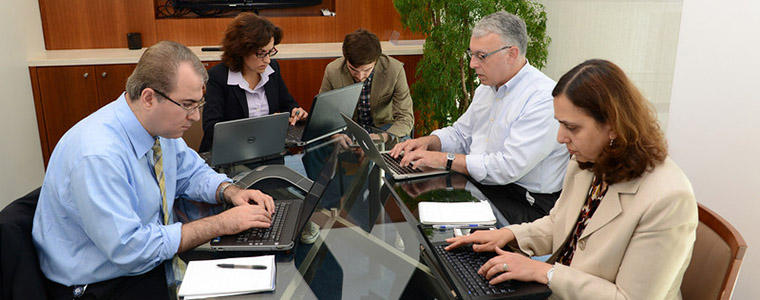Anti-government Sunni militants have swept across western and northern Iraq over the past week, gaining control of the cities of Mosul and Tikrit. Operating mainly under the banner of the State of Iraq and the Levant (ISIL, or also known as ISIS), in many places they seemed to have faced little to no resistance from the official Iraqi army, who, according to reports, laid down their arms and melted into the countryside. As they neared Baghdad, Kurdish paramilitary pesh merga fighters took control of the strategic oil town of Kirkuk, defending the city against the ISIS advance.

The U.S. Institute of Peace hosted a question-and-answer session on Twitter on Friday, June 13, to examine the origins of the crisis, its-cross border implications for Syria, and how the U.S. and Iraqi governments might respond.
Participants in the session from USIP included Khitam Al-Khaykanee, program officer for the Rule of Law team; Raya Barazanji, senior program officer for the Middle East & Africa; Sarhang Hamasaeed, senior program o fficer for the Middle East & Africa; Steven Heydemann, vice president for the Center of Applied Research on Conflict and head of USIP’s Syria program; and Manal Omar, associate vice president for the Middle East & Africa.
Here are some of their key comments. The entirety of the conversation, pegged to the hashtag #USIPIraq, is collected in this Tagboard.
Many in the online audience wondered about ISIL, the radical group that has long operated across the Syria-Iraq border. Raya Barazanji cautioned against seeing them as a monolithic force.
A: Politics+mil. needed. Extreme care, not certain only ISIS on other side e.g Sunni tribes/frustrated population #USIPIraq @bwrose83 @USIP
— Sarhang Hamasaeed (@sarhangsalar) June 13, 2014
Manal Omar, participating from Jordan, considered whether the ISIL offensive could be stopped without the use of militias.
@awsimp #USIPIraq every Iraqi I spoke w/in last 48 hours dont believe Iraq gov can push back, focus will be not allowing 2move 4ward
— Manal Omar (@ManalOmar) June 13, 2014
As the Iraqi government and the United States deliberate over their response to the crisis, Sarhang Hamasaeed called for a careful, comprehensive approach, noting that the anti-government forces may have a much broader base of support than was initially thought.
A: Politics+mil. needed. Extreme care, not certain only ISIS on other side e.g Sunni tribes/frustrated population #USIPIraq @bwrose83 @USIP
— Sarhang Hamasaeed (@sarhangsalar) June 13, 2014
Omar noted that many in the Middle East are skeptical that the Iraqi government will be able to swiftly find a way out of the crisis.
Being told by people in MENA region #Iraqcrisis is a major game changer & many people cannot see a way out or withdrawal of ISIS #USIPIraq
— Manal Omar (@ManalOmar) June 13, 2014
And while many analysts around the world were surprised at the apparent lack of resolve of the Iraqi army in the face of the ISIL advance, Khitam Al-Khaykanee (tweeting through USIP’s Twitter account) was more sympathetic, noting that the army still lacks some capabilities and may be exhausted by nearly continuous operations since the American withdrawal.
Iraqi Army in continuous fighting for Iraq, but IA has been trapped with the lack of communications across various units-KA @fwhllc
— U.S. Inst. of Peace (@USIP) June 13, 2014
Steven Heydemann, meanwhile, handled a number of questions on how the ISIL advance will affect Syria.
#USIPIraq @Ra_Srour @USIP Opposition coalition to respond to ISIS resurgence emerging in eastern Syria. May blunt ISIS gains.
— Steven Heydemann (@SHeydemann) June 13, 2014
Heydemann also discussed how Iran might respond to the situation.
#USIPIraq @ZPalatnik Iran will exploit ISIS gains to seek "anti-terror" coalition. Unlikely to succeed.
— Steven Heydemann (@SHeydemann) June 13, 2014
Read the entire conversation.



